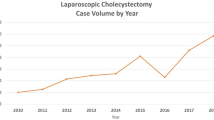Abstract
Background
Resident education in laparoscopic cholecystectomy (LC) was studied in a retrospective analysis of consecutive cases performed at two academic institutions with different educational approaches.
Methods
Each procedure was performed by a resident as operating surgeon under the direct guidance of one of a small, constant group of LC-certified attendings acting as first assistant. In group I (n = 48), residents acquired LC skills by graded exposure and surgical responsibility similar to their training in other general surgical procedures. In group II (n = 48) residents were additionally certified via an intensive course (including didactic and animal model experience) prior to assuming responsibility as surgeon.
Results
Results were similar in each group. No technical errors were identified. Blood transfusion was not required related to surgery. Conversion to an open procedure occurred in 10% and 8% in groups I and II, respectively. The rate of complications was 4% for group I and 8% for group II. A longer operating time was noted in group I and may be attributed to nonoperative reasons.
Conclusions
Education in LC via graded experience throughout residency achieves results similar to that found with the addition of an intensive course. This additional training may not be necessary for surgical residents.
Similar content being viewed by others
References
Bailey R, Imbembo A, Zucker K (1991) Establishment of a laparoscopic cholecystectomy training program. Am Surg 57: 231–236
Cuschieri A (1993) Endosurgical training methods: is it surgical training that is out of control? Surg Endosc 7: 71–72
Dent T (1991) Training, credentialing, and granting of clinical privileges for laparoscopic general surgery. Am J Surg 161: 399–403
Dent T (1992) Training, credentialing and evaluation in laparoscopic surgery. Surg Clin North Am 72: 1003–1011
Forde KA (1993) Reflections on surgical training. Surg Endosc 7: 73–74
Laws H (1991) Credentialing residents for laparoscopic surgery: a matter of opinion. Curr Surg 48: 684–686
Schirmer B, Edge S, Dix J, Miller A (1992) Incorporation of laparoscopy into a surgical endoscopy training program. Am J Surg 163: 46–52
Sharp W, Guyton D, Crans C, Abdu R, Young J, Dash S, Kremer R, Can A (1992) Initial experience with laparoscopic surgery: establishing a new surgical procedure. J Laparoendosc Surg 2: 151–155
Society of American Gastrointestinal Endoscopic Surgeons (1990) Granting of privileges for laparoscopic (peritoneoscopic) general surgery. Society of American Gastrointestinal Endoscopic Surgeons, Los Angeles
Tompkins R (1990) Laparoscopic cholecystectomy: threat or opportunity? Arch Surg 125: 1245
Author information
Authors and Affiliations
Rights and permissions
About this article
Cite this article
Friedman, R.L., Pace, B.W. Resident education in laparoscopic cholecystectomy. Surg Endosc 10, 26–28 (1996). https://doi.org/10.1007/s004649910005
Received:
Accepted:
Issue Date:
DOI: https://doi.org/10.1007/s004649910005




